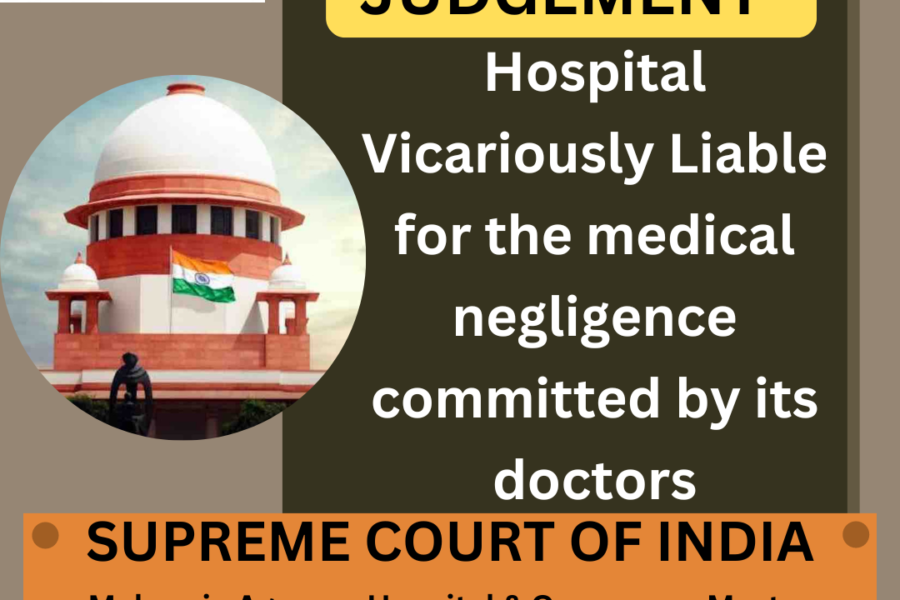Maharaja Agrasen Hospital v Master Rishabh Sharma
(Civil Appeal No. 6619 Of 2016)
Facts:
A Caesarean section was used to handle an early delivery (LSCS). The early baby was roughly thirty-two weeks old. Due to subpar facilities at the previous hospital, the baby was transferred to Maharaja Agrasen. There was no ROP test performed; it was maintained under surveillance. (retinopathy of prematurity). Additionally, the patient was never informed by the doctors of the possibility of ROP before or following delivery. After the mother became aware of her child’s unusual visual reaction, an ultrasound and eye exam were performed, and total retinal detachment was determined to be the cause. The baby became completely blind as a result of the doctor’s error. In light of this, a complaint has been filed under Section 12 of the Consumer Protection Act, requesting INR 1,30,25,000 in total compensation under several headings.
Observations made by the court:
The court noted, citing earlier rulings on medical negligence, that
When performing any professional work, a medical practitioner should be aware of the dangers and hazards to the same degree that other members of their field who are normally competent would be. He must apply the same level of reasonable expertise as other typically competent members of his trade would to whatever professional work he undertakes.
In addition, the bench gave the youngster and his mother INR 76,00,000 in compensation and gave guidelines for how to use the money. It further stated:
It is a regular occurrence for patients to visit a hospital based on its reputation, with the expectation that the medical staff will provide appropriate care. The hospital must defend commission or omission activities on behalf of its doctors if it is recruited on a contract basis, works with doctors who are not upholding their contractual obligations, or both.
Cause of action and burden of proof:
In a medical negligence case, damage is the most crucial element to consider because, to file a complaint, the complainant must demonstrate that he suffered harm. In this instance, the complainant bears the burden of proof and must also demonstrate that the harm was caused by the practitioner’s breach of duty. Medical negligence is defined as when a medical professional of ordinary caution violates a duty of care by doing an act of commission or omission.
The entire case falls under the category of vicarious responsibility, which handles situations in which one person is held accountable for the deeds of another. The idea is predicated on the legal maxim “Qui facit per se alium facit per se” which means “he who does an act through another shall be deemed in law to do it himself.”.
However, there must also be proof that the wrongdoer and the party for whom the act was performed had a relationship (employer-employee, master-servant).
JUDGEMENT:
The NCDRC’s conclusions were upheld by the Apex Court. The Hospital was found to be vicariously accountable for the accused doctors’ commission and omission of crimes. The complainants held the hospital, the paediatricians, and the senior ophthalmologist jointly and severally responsible for the breach of their duty to compensate the complainants. If they failed to do RoP testing later, they were also held accountable for egregious negligence. The respondents were granted a compensation of Rs. 76,00,000/-, and the Court also provided additional guidelines about the allocation of that sum.
The Court further specified the following actions that might be considered medical negligence:
o Failure by the medical practitioner to use reasonable care as required by law;
o Neglecting to advise the patient of the risks involved or potential outcomes;
o The patient sustains harm as a result of the healthcare provider’s failure to disclose the danger;
o The patient might have been spared the harm if the risk had been disclosed.
A negligence claim would be actionable if the aforementioned obligation was broken.
Adv. khanak sharma (D\1710\2023)

